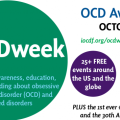OCD Treatment: Back to Basics

OCD is predicated on the formation of faulty beliefs that are maintained through negative reinforcement.
In previous posts, I have discussed various aspects of the “OCD Cycle,” but it never hurts to have a quick refresher.
After all, understanding how OCD works can help you see through its lies and help mobilize you to stand up and challenge it.
What is OCD, and how does OCD treatment work?
OCD has two mains parts: obsessions and compulsions. We’ll talk about the obsessions first.
Obsessions are unwanted thoughts, impulses, or images that intrude into your awareness, and cause significant anxiety or distress. Thoughts include such examples as, “What if I get sick?”, “What if I secretly want to harm my loved ones?“, “What if I just got sexually aroused by that child?“, and “What if I forgot to lock my front door and someone breaks in?“.
Impulses are experienced as urges to commit actions that you wouldn’t want to commit. Some examples of unwanted impulses include the urge to blurt out offensive or inappropriate statements, grab a policeman’s gun and shoot someone, or do something sexually inappropriate in public.
Images often consist of violent or disturbing mental imagery. You might be plagued by mental movies of extreme violence (e.g, seeing images of people getting killed or mutilated) or inappropriate or unwanted sexual contact (e.g., seeing yourself having sex with someone who you wouldn’t want to have sex with).
Compulsions (also referred to as “rituals“) are the behavioral or mental responses that you use to reduce the anxiety brought on by your obsessions. Behavioral compulsions include washing, checking, or rearranging. Mental rituals may involve analyzing thoughts, mentally reviewing past events, or mentally reassuring yourself.
There are many more examples of obsessions–as well as behavioral and mental rituals–than the ones I’ve mentioned above.
Avoidance behaviors are considered a type of preemptive compulsion that are used to prevent anxiety from spiking in the first place. Similar to other compulsions, avoidance is a way to control and reduce anxiety.
Obsessions (regardless of whether they consist of intrusive thoughts, impulses, or images) increase anxiety. Because anxiety is perceived as uncomfortable or intolerable, the individual engages in compulsions to reduce the anxiety they are feeling. Compulsions “work” at first, in the sense that they do directly reduce anxiety.
When a negative stimulus (e.g., anxiety) is reduced or taken away by the performance of a particular behavior (e.g., compulsions), that behavior becomes more likely to be repeated in the future whenever the negative stimulus is re-encountered. This phenomenon is more generally called negative reinforcement. Because compulsions “work,” they begin to be used preferentially as “coping strategies” in response to anxiety-producing situations. Compulsions quickly become the default ways individuals respond to their anxiety.
All is okay for awhile, but ultimately, there are some major downsides to using compulsions to reduce anxiety. First, compulsions tend to reinforce faulty beliefs and prevent people from developing healthy, more realistic beliefs about their anxiety triggers.
For example, let’s consider someone with contamination OCD who believes, “If I touch a doorknob and don’t wash my hands, I’ll get sick.” If this person consistently washes their hands after touching doorknobs, washing becomes seen as a necessary step to avoid getting sick (even if it isn’t). Continued washing prevents the person from ever realizing that washing is optional, and as a consequence, washing reinforces the false belief that health is fragile and that it can only be maintained through elaborate washing behaviors.
Before long, the person becomes uncomfortable with even the most innocent casual contact, because it is seen as potentially threatening. Fear begins generalizing to more and more situations, and soon the person feels uncomfortable touching anything that hasn’t been cleaned recently. The person’s tolerance for ambiguous situations is reduced, if not completely eliminated.
Furthermore, the anxiety-reducing properties of compulsions tend to diminish over time, and the person must typically expand their compulsions to get the same anxiety reducing effect. What began as a simple washing behavior soon expands to 2-, 3-, 4- repetitions, and the wash becomes longer and more elaborate.
Avoidance of anxiety-producing triggers has the same effect as performing compulsions. If people begin to avoid situations that cause anxiety, they never learn that anxiety is tolerable and will reduce on its own, even without performing rituals.
I’ve discussed handwashing quite a bit in the example above, but the same basic principles apply to ALL types of OCD.
The most effective treatment for OCD, exposure and response prevention (ERP), works by bucking this entire OCD system. With the help of a OCD therapist (or on their own), people with OCD develop the courage to begin violating the unhealthy, non-reality based rules that OCD has imposed on their lives. Through a series of calculated risks, they begin improving their tolerance for ambiguous situations. Through exposure and response prevention (ERP), they improve their ability to tolerate uncertainty.
By performing exposures without rituals, individuals with OCD also indirectly refine their beliefs about how the world works — replacing faulty OCD beliefs with healthier, more realistic beliefs that are not based on what-ifs or fear. Through consistent practice, the “OCD Cycle” is slowly dismantled, and the person begins to feel free again.
Questions? Comments? What types of faulty beliefs form the basis of your OCD? What rituals and avoidance behavior does your OCD use to maintain these beliefs? Sound off below…
Want Updates about New Content?
Follow Me!
Follow @drstevenseay












I started with motor tics at age three, progressed to OCD by age five. Obsessions have changed over time. My predominate obsession is health anxiety, more specifically a disease that begins with letter “c”. Obviously, inability to write the word is avoidance. The crazy thought is if I say or write that word, I will be doomed. I won’t wear pink because it represents a awareness of a particular type of “c”. Know I will repetively ask my husband for reassurance. If the way he answers doesn’t feel right, I will continue to ask him over and over etc. I will also search the internet for info. about disease and check my body, to the point of bruising, for lumps.
It’s really helpful that you’re aware of your compulsions and avoidance behaviors. This puts you in a good position to begin developing an exposure hierarchy, (starting with easier, less anxiety-producing situations). Moreover, because you’re afraid of the words, statements, and thoughts themselves, there is great potential for the exposures to help you. It’s all about finding the right starting place and then building from there.
Hello Steve…First off I want to tell you that I am old enough to be your parent lol BUT at age 65, I have had this miserable stone of OCD hanging over my head since I was 25 !! It actually STARTED when I was about 10 and hen around my teen age years it disappeared because LIFE was WAY more fun and adventurous than OCD ! Then after getting married in 17 a he age of 18, I have to go from a full of energy teen to a father and a provider and that stress STARTED the slow slid back. I DID manage to deal with it but as the STRESS of life went higher so did the uncomfortable feeling. I wanted to write you to let you know that just last evening I ran across YOUR site and it is THE only information that addresses the ROOT CAUSE of OCD…and you have an EXTREEMLY good insight into this PITA condition. I wish I was closer to Florida but I live in Ohio…I also find it fascinating that while MOST with OCD KNOW it is ODD they, like ME, have to do compulsions to get relief. That relief is what you point out a relief of FEAR and anxiety and it is our way of coping UNTIL we can get better ways to OVERCOME it. Should not be this hard but at LEAST I AM able to function in life ! I feel bad for those that can not even leave the house ! I will get over this THIS year because I have wasted enough time and energy on it for one life lol !! I just wanted to say that you have an extremely precise way of transmitting information and I commend you for that !!
Thanks for reading, and thanks for sharing your own experience with your OCD. Life with OCD is hard, but there is hope! Here’s to you overcoming your OCD this year!
Great refresher “course” which we can all use once in a while. As you say, the more we understand OCD the better equipped we are to fight it!
Exactly! 🙂
Hello Dr Seay,
First perusing your site here, I have to say what an amazing place for me to find. Second, what a genuinely caring Dr. you seem to be, there’s such a wealth of information on this site and for that I thank you!
I wanted to ask your thoughts on the temper/anger side of OCD … I have so many compulsions and rituals my wife has such a hard time with my rituals and reassurance let alone the attitude and frustration I seem to have with it. I’m just so overwhelmed with it all. I’ve become so bad about hand washing and contamination issues. Unrealistic health fears, IE: Nut allergies. I have eaten nuts all my life since a child (I’m 37 now) and in the past year I have become so obsessed with the fear of suddenly becoming allergic to nuts and may have a bad reaction I can’t even touch things that may have come in contact with nuts.I guess my question was two; thoughts on the nut obsession and advice on my ill manner I seem to have daily and worsening each day. My wife is a good woman and very supportive but everyone has their limit, I know shes so sad, I’ve hurt I know with my OCD. She tends to take it all personally…I just don’t know what to do…Any thoughts or advice I would appreciate. Thanks very much for your time.
Chris
Thanks for reading! RE: the nut allergy fear, this is more common than you might think. A post I started — but never quite finished — was on the fear of anaphylaxis. I’ll try to finish it up at some point. In the meantime, just remember that nearly all forms of OCD focus on fears of things we can’t know perfectly. That’s why learning to tolerate uncertainty is core to overcoming most types of OCD. It sounds like it could be helpful to launch a more offensive attack against your OCD. Build a hierarchy of feared situations that you typically avoid. You’ve already mentioned a few examples. Rate each situation on a 0-10 scale, and begin targeting situations in the 3 range at first. It will also be important to make a list of your rituals, including those involving your wife. Establish specific “quit dates” for each one, and begin gradually incorporating these guidelines. Although it will be scary at first, doing so will help you mobilize yourself to address your OCD. Your wife will also appreciate that you’re beginning to take these proactive steps. If this all feels too overwhelming, find an OCD therapist to help guide you in the process. They can help break things down into manageable parts, and they can also provide more helpful information to both you and your wife. Good luck!